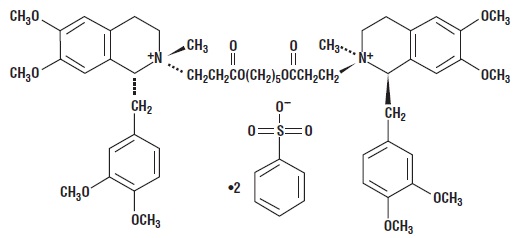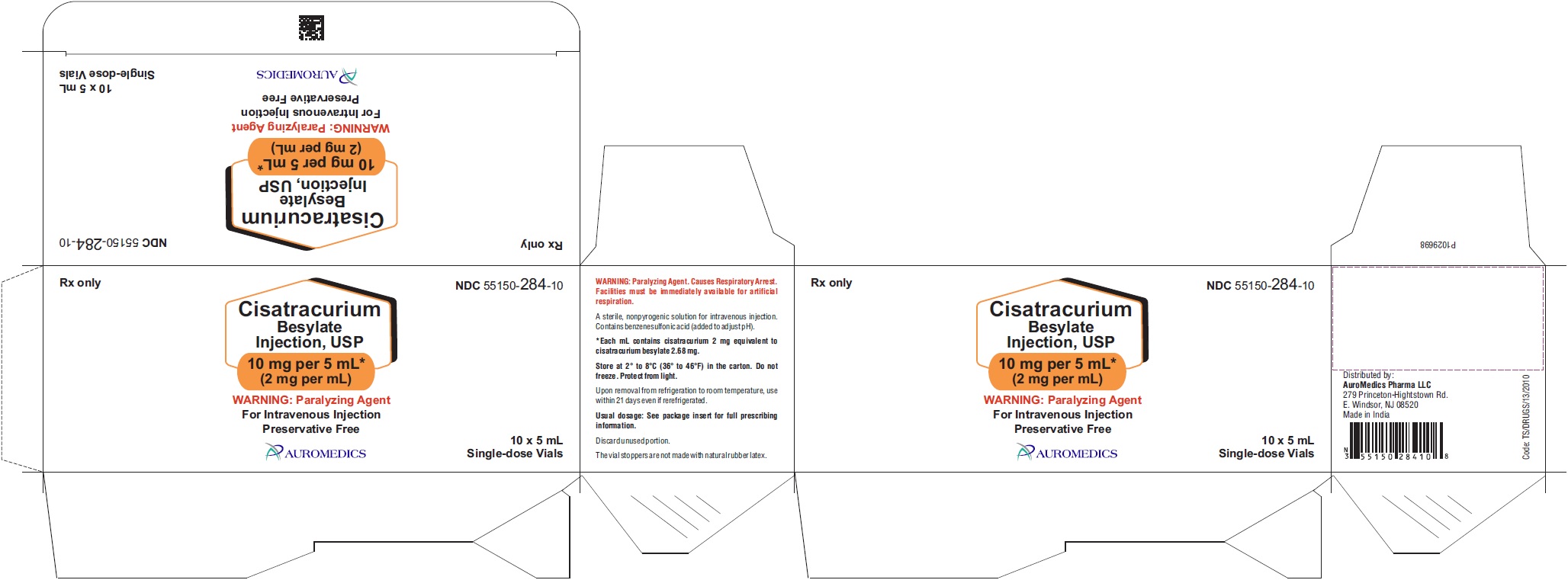Cisatracurium
Generic name: cisatracurium
Brand name: Nimbex
Dosage form: intravenous solution (10 mg/mL; 2 mg/mL; 20 mg/10 mL)
Drug class: Neuromuscular blocking agents
Medically reviewed by A Ras MD.
What is cisatracurium?
Cisatracurium is a prescription medicine that is used to calm muscles during surgery. It is used to calm muscles while on a breathing machine.
Description
Cisatracurium besylate injection, USP is a nondepolarizing skeletal neuromuscular blocker for intravenous administration. Compared to other neuromuscular blockers, it is intermediate in its onset and duration of action. Cisatracurium besylate is one of 10 isomers of atracurium besylate and constitutes approximately 15% of that mixture. Cisatracurium besylate is [1R-[1α,2α(1′R*,2′R*)]]-2,2′-[1,5-pentanediylbis[oxy(3-oxo-3,1-propanediyl)]]bis[1-[(3,4-dimethoxyphenyl)methyl]-1,2,3,4-tetrahydro-6,7-dimethoxy-2-methylisoquinolinium] dibenzenesulfonate. The molecular formula of the cisatracurium parent bis-cation is C53H72N2O12 and the molecular weight is 929.2. The molecular formula of cisatracurium as the besylate salt is C65H82N2O18S2 and the molecular weight is 1243.50. The structural formula of cisatracurium besylate is:

The log of the partition coefficient of cisatracurium besylate is -2.12 in a 1-octanol/distilled water system at 25°C.
Cisatracurium besylate injection, USP is a sterile, non-pyrogenic, clear colorless to slightly yellow or greenish-yellow solution provided in 5 mL vial. The pH is adjusted to 3.25 to 3.65 with benzenesulfonic acid.
- The 5 mL single-dose vials contain 2 mg/mL cisatracurium, equivalent to 2.68 mg/mL cisatracurium besylate, USP.
Mechanism of Action
Cisatracurium binds competitively to cholinergic receptors on the motor end-plate to antagonize the action of acetylcholine, resulting in blockade of neuromuscular transmission. This action is antagonized by acetylcholinesterase inhibitors such as neostigmine.
Before taking cisatracurium, tell your doctor:
- If you are allergic to cisatracurium; any part of this medicine; or any other drugs, foods, or substances. Tell your doctor about the allergy and what signs you had.
This medicine may interact with other drugs or health problems.
Tell your doctor and pharmacist about all of your drugs (prescription or OTC, natural products, vitamins) and health problems. You must check to make sure that it is safe for you to take cisatracurium with all of your drugs and health problems. Do not start, stop, or change the dose of any drug without checking with your doctor.
What are some things I need to know or do while I take cisatracurium?
- Tell all of your health care providers that you take cisatracurium. This includes your doctors, nurses, pharmacists, and dentists.
- Very bad and sometimes deadly allergic side effects have rarely happened. Talk with your doctor.
- Some products have benzyl alcohol. Do not give a product that has benzyl alcohol in it to a newborn or infant. Talk with the doctor to see if this product has benzyl alcohol in it.
- If you are 65 or older, use cisatracurium with care. You could have more side effects.
- Tell your doctor if you are pregnant or plan on getting pregnant. You will need to talk about the benefits and risks of using cisatracurium while you are pregnant.
- Tell your doctor if you are breast-feeding. You will need to talk about any risks to your baby.
How is cisatracurium best taken?
Use cisatracurium as ordered by your doctor. Read all information given to you. Follow all instructions closely.
- This medicine is given as a shot into a vein or into a vein nonstop for a period of time.
What do I do if I miss a dose?
- This medicine is given on an as needed basis.
What are the side effects of cisatracurium that I need to call my doctor about immediately?
WARNING/CAUTION: Even though it may be rare, some people may have very bad and sometimes deadly side effects when taking a drug. Tell your doctor or get medical help right away if you have any of the following signs or symptoms that may be related to a very bad side effect:
- Signs of an allergic reaction, like rash; hives; itching; red, swollen, blistered, or peeling skin with or without fever; wheezing; tightness in the chest or throat; trouble breathing, swallowing, or talking; unusual hoarseness; or swelling of the mouth, face, lips, tongue, or throat.
- Seizures.
What are some other side effects of cisatracurium?
All drugs may cause side effects. However, many people have no side effects or only have minor side effects. Call your doctor or get medical help if you have any side effects that bother you or do not go away.
These are not all of the side effects that may occur. If you have questions about side effects, call your doctor. Call your doctor for medical advice about side effects.
You may report side effects to the FDA at 1-800-332-1088. You may also report side effects at https://www.fda.gov/medwatch.
If overdose is suspected:
If you think there has been an overdose, call your poison control center or get medical care right away. Be ready to tell or show what was taken, how much, and when it happened.
How do I store and/or throw out cisatracurium?
- If you need to store cisatracurium at home, talk with your doctor, nurse, or pharmacist about how to store it.
Label
PACKAGE LABEL-PRINCIPAL DISPLAY PANEL – 10 MG PER 5 ML (2 MG PER ML) – CONTAINER-CARTON (10 VIALS)
- Rx only NDC 55150-284-10
Cisatracurium
Besylate
Injection, USP
10 mg per 5 mL*
(2 mg per mL)
WARNING: Paralyzing Agent
For Intravenous Injection
Preservative Free
10 x 5 mL
AUROMEDICS Single-dose Vials

SRC: NLM .
